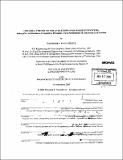Toward a theory of the evolution of business ecosystems : enterprise architectures, competitive dynamics, firm performance & industrial co-evolution
Author(s)
Piepenbrock, Theodore F. (Theodore Frederick), 1965-
DownloadFull printable version (463.0Mb)
Other Contributors
Massachusetts Institute of Technology. Engineering Systems Division.
Advisor
Charles H. Fine.
Terms of use
Metadata
Show full item recordAbstract
This dissertation contributes toward the building of a theory of the evolution of business ecosystems. In the process, it addresses a question that has been posed by evolutionary theorists in the economics and sociology literatures for decades: "Why do firms in the same industry vary systematically in performance over time?" Seeking a systematic explanation of a longitudinal phenomenon inevitably requires characterizing the evolution of the industrial ecosystem, as both the organization (firm) and its environment (industry, markets and institutions) are co-evolving. This question is therefore explored via a theoretical sample in three industrial ecosystems covering manufacturing and service sectors, with competitors from the US, Europe and Japan: commercial airplanes, motor vehicles and airlines. The research is based primarily on an in depth seven-year, multi-level, multi-method, field-based case study of both firms in the large commercial airplanes industry mixed duopoly as well as the key stakeholders in their extended enterprises (i.e. customers, suppliers, investors and employees). This field work is supplemented with historical comparative analysis in all three industries, as well as nonlinear dynamic simulation models developed to capture the essential mechanisms governing the evolution of business ecosystems. (cont.) A theoretical framework is developed which endogenously traces the co-evolution of firms and their industrial environments using their highest-level system properties of form, function and fitness (as reflected in the system sciences of morphology, physiology and ecology), and which embraces the evolutionary processes of variation, selection and retention. The framework captures the path-dependent evolution of heterogeneous populations of enterprise architectures engaged in symbiotic inter-species competition and posits the evolution of dominant designs in enterprise architectures that oscillate deterministically and chaotically between modular and integral states throughout an industry's life-cycle. Architectural innovation - at the extended enterprise level - is demonstrated to contribute to the failure of established firms, with causal mechanisms developed to explain tipping points.
Description
Thesis (Ph. D.)--Massachusetts Institute of Technology, Engineering Systems Division, 2009. Cataloged from PDF version of thesis. Vita. Includes bibliographical references (v. 4, p. 698-745).
Date issued
2009Department
Massachusetts Institute of Technology. Engineering Systems DivisionPublisher
Massachusetts Institute of Technology
Keywords
Engineering Systems Division.